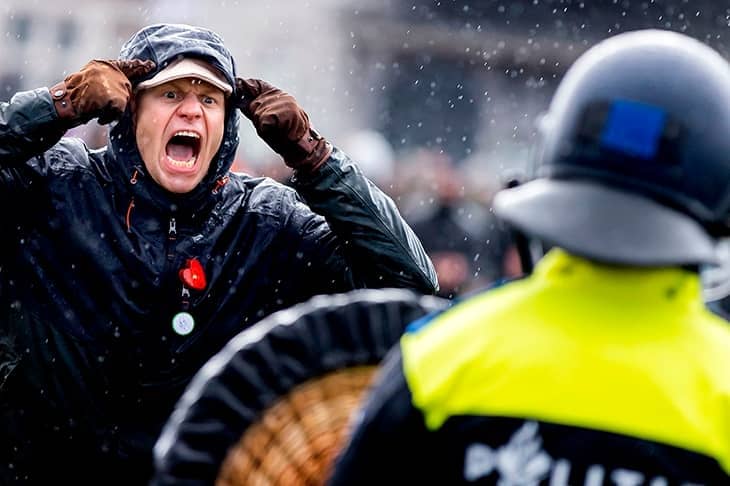Amsterdam
These are dangerous times in the Netherlands. Anti-lockdown mobs have torched cars, thrown rocks and attacked the police. In Rotterdam, police used live fire, in scenes more reminiscent of New York or LA than the birthplace of Erasmus. The protests are ostensibly in response to government plans to restrict the use of indoor spaces only to people with a Covid pass, showing they have been vaccinated or they have recovered from the virus. The (unvaccinated) Dutch — very much a minority — don’t take kindly to being turned into second-class citizens.
Frank Paauw, Amsterdam’s tall, silver-haired police chief, suspects darker forces are at work. I met him during a TV interview, his gun conspicuous by its presence. Some protestors are likening themselves — obscenely — to the Dutch resistance against Nazi occupation, while hooligans and the far right are coordinating via WhatsApp and Facebook. Message to Nick Clegg in Menlo Park, California: this is not the metaverse, it’s reality. Paauw warned last month that the Netherlands was no longer ‘Europe’s quiet hamlet’, following the murder of a top TV reporter investigating organised crime and drugs trafficking. Mark Rutte, the long-serving Prime Minister, has grudgingly accepted heightened police security and, for now, has abandoned his bike.
My trip to Amsterdam was to promote the paperback version of my book, The Powerful and the Damned, a private diary recorded during my 14 years as editor of the Financial Times. My first appearance was on Buitenhof, NPO public television’s Sunday current-affairs show, alongside the police chief, two politicians and a virologist. My fellow interloper was Mary Trump, a psychiatrist and The Donald’s hyper-critical niece. She is also the author of Too Much and Never Enough, which sold one million copies on publication day. The host of Buitenhof (which means ‘Outer Court’) is Twan Huys, a handsome fiftysomething whom Mary compared with the late Peter Jennings, the unflappable ABC news anchor.
I wish fellow Sunday host Andrew Marr well with his decision to leave the BBC after 21 years in order to ‘get his voice back’. He wants the freedom to state his opinions rather than having them — in his words — buried in formaldehyde on the orders of Tim Davie, director-general. Everybody seems to think strong opinions are the only way to go. I am not so sure. Jennings, who kept his views largely to himself, would have sided more with Davie than his outbound anchor.
I am regularly asked: do you miss being editor of the FT? My answer is only when there’s a big news story like the insurrection at the US Capitol. On balance, I’m glad I am not running a remote newsroom during Covid and the culture wars. These thoughts occurred on hearing — by text, naturally — that Geordie Greig had been ousted as editor of the Daily Mail. Greig blotted his copybook when he gave an ill-judged (but most welcome) interview for ‘Lunch with the FT’. He suggested the Mail brand had become toxic for advertisers during Paul Dacre’s tenure. A rebuttal followed swiftly. The imperious tone was unmistakable; but it was worth a telephone call just to be sure. ‘I’m very impressed,’ boomed Dacre, ‘that the FT is still in the business of serious journalism.’
I have no idea whether Lord Rothermere felt uncomfortable with the Mail’s critical coverage of Boris Johnson. Dacre’s return as editor-in-chief after his dalliance with the Ofcom chairmanship looks less like a palace coup, more a restoration. It is also part of a wider shake-up ahead of a tricky move to take the group private. Geordie might bear in mind the advice of Ben Bradlee, the legendary editor of the Washington Post. ‘When you step down,’ he once told me, ‘that’s when you find out who your friends are.’
At the launch of Iain Dale’s new book, The Presidents: 250 Years of American Political Leadership, I bumped into another ex-editor, George Osborne, recently of the Evening Standard. Conversation turned to the upheaval at the Mail. Editors, I said, are like enlightened despots but they serve at the pleasure of the proprietor. George chuckled. I asked him what he missed most about being editor. ‘The extraordinary power,’ he glowed.






Comments